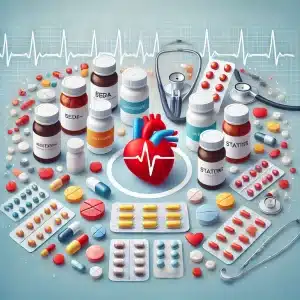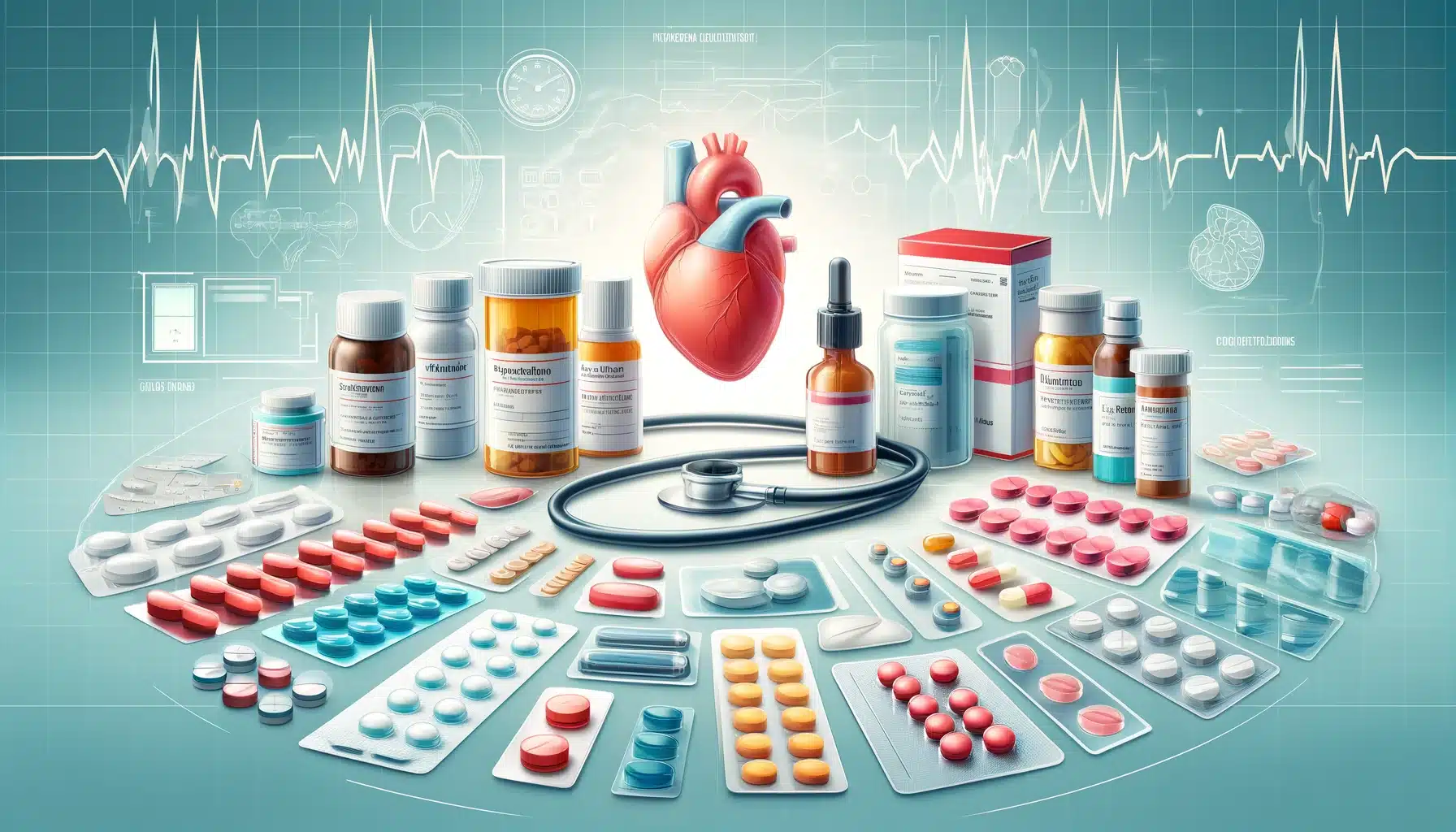Introduction
Cardiology medications are essential for managing and treating heart and vascular conditions. These drugs play a vital role in the treatment of various cardiovascular issues such as hypertension, heart failure, and coronary artery disease. The correct selection and proper dosage of these medications can significantly improve patients’ quality of life, while improper use can lead to severe side effects. In this article, we will explore the top 10 commonly used cardiology medications, their uses, side effects, and recommended dosages.
 1. ACE Inhibitors (Angiotensin-Converting Enzyme Inhibitors)
1. ACE Inhibitors (Angiotensin-Converting Enzyme Inhibitors)
- Uses: ACE inhibitors are primarily used to treat high blood pressure and heart failure. They work by relaxing blood vessels, which lowers blood pressure and reduces the strain on the heart.
- Side Effects: Common side effects include a persistent dry cough, elevated blood potassium levels, low blood pressure, and dizziness. Serious side effects can include kidney dysfunction and angioedema (swelling beneath the skin).
- Dosage: Dosage varies depending on the specific medication (e.g., lisinopril, enalapril) and patient needs, typically starting from a low dose and adjusting based on response and tolerability.
2. Beta-Blockers
- Uses: Beta-blockers are used to manage abnormal heart rhythms, protect against recurrent heart attacks, and treat high blood pressure. They function by slowing the heart rate and reducing blood pressure.
- Side Effects: Common side effects include fatigue, cold hands and feet, weight gain, and depression. In some cases, beta-blockers can cause breathing difficulties in patients with asthma or other respiratory conditions.
- Dosage: The dosage depends on the specific drug (e.g., metoprolol, atenolol) and condition being treated. They are often started at a low dose and gradually increased.
3. Statins
- Uses: Statins are prescribed to lower cholesterol levels, thereby reducing the risk of heart attack and stroke. They work by blocking a substance your body needs to make cholesterol.
- Side Effects: Muscle pain, digestive problems, and increased blood sugar levels are common side effects. Rarely, statins can cause liver damage and muscle breakdown (rhabdomyolysis).
- Dosage: Dosage varies by medication (e.g., atorvastatin, simvastatin) and is often adjusted to achieve target cholesterol levels.
4. Antiplatelet Agents
- Uses: Antiplatelet agents, such as aspirin and clopidogrel, help prevent blood clots in patients with cardiovascular conditions like coronary artery disease.
- Side Effects: Bleeding, gastrointestinal ulcers, and allergic reactions are potential side effects.
- Dosage: Aspirin is often prescribed at a low dose (81-325 mg daily), while clopidogrel dosage is typically 75 mg once daily.
5. Diuretics
- Uses: Diuretics, also known as “water pills,” help reduce blood pressure and relieve swelling by removing excess fluid and sodium from the body.
- Side Effects: Increased urination, electrolyte imbalance, dizziness, and dehydration are common side effects.
- Dosage: The dosage depends on the specific type of diuretic (e.g., hydrochlorothiazide, furosemide) and the patient’s condition, usually starting with a low dose.
6. Calcium Channel Blockers
- Uses: These medications are used to lower blood pressure, treat angina (chest pain), and control heart rate in certain conditions.
- Side Effects: Swelling of the legs, dizziness, and constipation are common. In some cases, they can cause a rapid or irregular heartbeat.
- Dosage: Dosage varies with the specific medication (e.g., amlodipine, verapamil) and patient response, typically starting with a standard dose.
7. Nitrates
- Uses: Nitrates, like nitroglycerin, are used to prevent and treat angina by relaxing and widening blood vessels, allowing more blood to flow to the heart muscle.
- Side Effects: Headaches, dizziness, low blood pressure, and flushing are common side effects.
- Dosage: Nitrates are usually taken as needed, especially during an angina attack, with dosages varying based on the formulation (e.g., sublingual tablets, patches).
8. Angiotensin II Receptor Blockers (ARBs)
- Uses: ARBs are used for high blood pressure, heart failure, and kidney protection in diabetes. They work by blocking the effects of angiotensin II, lowering blood pressure.
- Side Effects: Dizziness, hyperkalemia (high potassium), and renal impairment are common side effects.
- Dosage: The dosage depends on the medication (e.g., losartan, valsartan) and condition, often adjusted for effectiveness and tolerability.
9. Digoxin
- Uses: Digoxin is used to treat heart failure and certain types of irregular heartbeats. It improves heart strength and efficiency, helping control the heart rate.
- Side Effects: Nausea, dizziness, visual disturbances, and confusion can occur. Digoxin toxicity is a serious risk, particularly in elderly patients.
- Dosage: Dosage is highly individualized and often requires careful monitoring of blood levels to avoid toxicity.
10. Anticoagulants
- Uses: Anticoagulants like warfarin and newer agents like rivaroxaban are used to prevent blood clots in patients with conditions like atrial fibrillation, deep vein thrombosis, and pulmonary embolism.
- Side Effects: Bleeding is the most significant side effect, along with easy bruising and gastrointestinal upset.
- Dosage: Dosage varies significantly among anticoagulants and requires regular monitoring, especially for drugs like warfarin, to maintain the correct balance between preventing clots and causing excessive bleeding.
Managing Side Effects
Proper management of side effects is crucial for patient compliance and the effectiveness of cardiology medications. Regular monitoring, dosage adjustments, and patient education on lifestyle modifications can help mitigate the adverse effects.
Conclusion
Cardiology medications are integral in managing heart-related conditions. Understanding the uses, side effects, and appropriate dosages of these medications can empower patients and healthcare providers to optimize treatment outcomes. Always consult with a healthcare professional before starting or changing any medication regimen.
Frequently Asked Questions (FAQs)
- What should I do if I miss a dose of my cardiology medication?
- It depends on the medication. Generally, take the missed dose as soon as you remember unless it is almost time for your next dose.
- Can I take over-the-counter medications with my heart medications?
- Always consult your doctor or pharmacist before combining over-the-counter medications with prescription drugs to avoid interactions.
- How long will I need to take these medications?
- The duration varies by condition and medication. Some medications may be needed long-term or even for life.
- What are the signs of an allergic reaction to heart medication?
- Signs include rash, itching, swelling, severe dizziness, and trouble breathing. Seek immediate medical attention if these occur.
- Can lifestyle changes reduce my need for heart medications?
- Yes, healthy lifestyle changes like diet, exercise, and quitting smoking can reduce the need for some medications or lower dosages.

